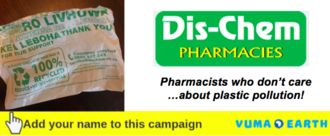-
Tell Namibia to put a permanent ban on all trophy huntingElephants, lions, and rhinos, and giraffes are all endangered and trophy hunting makes the station worse for them. The hunters also target the biggest and healthiest animals, leading to a lack of genetic diversity. Also, trophy hunting does not benefit the local communities, as only 3 percent of the funds spent on hunting ever go to the rural people.2,560 of 3,000 SignaturesCreated by Jad Abou Zaher
-
Ban Styrofoam, Plastic Cutlery and Straws in Mauritius!Plastic and styrofoam can take 500 years to biodegrade in the ocean. Nearly every bit of plastic ever created still exists. It’s toxic, never goes away, and is piling up in our landfills and oceans. So the less we can use, the better. Recycling is too late. An article in the independent last month states "Recycling is an easy cop-out for governments and large corporations, but the truth is that we have to take very different action if we want to stop irreversibly poisoning the planet." Popular pressure will push governments to adopt and implement strict measures on single use plastic, which is one of the biggest environmental problems we face today. The CNN article continues: "We can do much better. Immediate steps are needed. Governments and economists must act to address the recent collapse in markets for recycled plastic; production and recycling must become inextricably linked in a circular economy." Styrofoam containers, plastic cutlery and straws are typically used no more than an hour or two and then sit in landfills for hundreds of years. They are the epitome of consumerism. Refuse them. Billions of styrofoam coffee cups and containers are thrown each year. Even paper cups are lined with plastic. Disposable cutlery and straws are among the worst plastic pollution culprits. Like plastic bags and bottles, they’re used just once, for a few minutes, and then thrown away to stay decades on Earth. Pledge to yourself never to use a straw again. Please sign our petition today to help take Mauritius to the next level, after banning plastic bags four years ago, and join growing worldwide action by banning replaceable or unnecessary plastic products including styrofoam products, plastic cutlery and straws. Footnotes 1 Single-use or disposable plastics are commonly used for packaging and include items intended to be used only once before they are thrown away or recycled. https://wedocs.unep.org/bitstream/handle/20.500.11822/25496/singleUsePlastic_sustainability.pdf?isAllowed=y&sequence=1 2 https://www.weforum.org/agenda/2016/10/every-minute-one-garbage-truck-of-plastic-is-dumped-into-our-oceans/ 3 https://www.theguardian.com/business/2016/jan/19/more-plastic-than-fish-in-the-sea-by-2050-warns-ellen-macarthur 4 https://www.westerncape.gov.za/general-publication/plastic-pollution 5 https://www.bbc.com/news/science-environment-445794222,480 of 3,000 SignaturesCreated by Vandana Nathoo
-
Pledge to save water for World Water Day 2019Access to clean water is a basic human right for all. Our resources are currently under severe strain due to pollution, misuse and climate change. In order to guarantee this critical natural resource for our future, we all need to take responsibility and take action NOW.2,074 of 3,000 SignaturesCreated by Keshree Pillay
-
COCA COLA - CAN WE GO BACK TO GLASS?We only have ONE earth and Coca Cola is presently at the forefront of continually bringing damage to our environment, both land and sea. I am 12 years old now and would love to be part of a future that shows that the generation that came before us made responsible and caring decisions for all of humanity and this beautiful earth that was loaned to us. History will reflect the good and the bad - Coco Cola you have the ability now to make the right decisions!291 of 300 SignaturesCreated by Caldun Jurel Pillay
-
Save 7 Dams Conservancy! We need nature not more luxury housing!The Seven Dams Conservancy area is Bloemfontein South Africa - the capital city of the Free State province, is home to endangered animal, insect, reptile, amphibian, bird and plant life. It serves as a central point for all residents in the surrounds to meet for recreation, community building, exercise and mental retreat to nature. It serves a vital role in the mental and physical well-being of the residents of Bloemfontein, as well as being home to endangered species. We cannot allow unconstitutional financial gain to rob the taxpayers and residents of South Africa of another one of our natural treasures. Together we can push back!3,220 of 4,000 SignaturesCreated by Angie Vorster
-
RSA: Ban Single-Use PlasticsThe equivalent of one garbage truck of plastic (2) enters our oceans every minute and by 2050, there will be more plastic by weight in the ocean than fish (3). More than one million bags are used every minute worldwide - and around half are used just once before being thrown away. Every plastic bag is used for only 15 minutes on average - but it can take up to 500 years to decompose (4). Plastic is killing marine animals and seabirds (5), destroying the marine environment as well as people’s livelihoods, infiltrating the human food chain and causing cancers and birth defects. Scientists have found plastic in tap water and even in salt and beer. (6) Currently South Africa ranks as one of the worst offenders in mismanaging its plastic waste. (7) South Africans use 8 billion plastic shopping bags per year - and a plastic carrier bag levy introduced in 2003 has failed to have a meaningful impact. (8) By contrast, 28 African countries (9) such as Kenya, Rwanda, Morocco and Cameroon have banned the use, manufacture, importation and distribution of disposable plastic bags. Plastic debris not only results in high cleaning-up costs but also brings huge losses for the tourism, fisheries and shipping industries. It threatens our health, constitutional rights, water resources and climate. Please sign our petition today to help turn SA from a laggard in preventing plastic pollution into a world leader in producing and using sustainable alternatives. This petition will be delivered to the top four political parties' (10) representatives in parliament. Yours sincerely The Cape Town Greenpeace Volunteers, African Climate Reality Project (ACRP), South African Faith Communities Environment Institute (SAFCEI), Fossil Free South Africa, Extinction Rebellion, Wild Rescue, Transparenci, Easy Eco, Green Anglicans, Shop Zero, the Durban Greenpeace Volunteers, Ocean Pledge and the thousands of concerned citizens who have added their signatures. #bansingleuseplasticSA #ProtectTheOceans Footnotes – 1 Single-use or disposable plastics are commonly used for packaging and include items intended to be used only once before they are thrown away or recycled. https://wedocs.unep.org/bitstream/handle/20.500.11822/25496/singleUsePlastic_sustainability.pdf?isAllowed=y&sequence=1 2 https://www.weforum.org/agenda/2016/10/every-minute-one-garbage-truck-of-plastic-is-dumped-into-our-oceans/ 3 https://www.theguardian.com/business/2016/jan/19/more-plastic-than-fish-in-the-sea-by-2050-warns-ellen-macarthur 4 https://www.westerncape.gov.za/general-publication/plastic-pollution 5 https://www.bbc.com/news/science-environment-44579422 6 A study found that 83% of tap water worldwide is contaminated with plastic micro-fibres. Another discovered that some 73% out of 233 deep water fish from the Northwest Atlantic Ocean had ingested plastic particles. 7 South Africa is currently ranked 11th in the world for mismanaged plastic waste. https://www.iswa.org/fileadmin/user_upload/Calendar_2011_03_AMERICANA/Science-2015-Jambeck-768-71__2_.pdf 8 https://econrsa.org/papers/p_papers/pp18.pdf 9 Benin, Burkina Faso, Cameroon, Cape Verde, Democratic Republic of Congo (DRC), Republic of Congo, Eritrea, Gabon, Gambia, Guinea-Bissau, Ivory Coast, Kenya, Madagascar, Malawi, Mali, Mauritania, Mauritius, Morocco, Niger, Rwanda, Senegal, Seychelles, South Sudan, Tanzania, Togo, Tunisia, Uganda and Zambia: https://en.wikipedia.org/wiki/Phase-out_of_lightweight_plastic_bags 10 African National Congress, Democratic Alliance, Economic Freedom Fighters and Inkatha Freedom Party currently hold 10 seats or more in the National Assembly. https://en.wikipedia.org/wiki/National_Assembly_of_South_Africa15,400 of 20,000 SignaturesCreated by Elaine Mills
-
Dispensing in plastic bags - Dis-chem’s unhealthy waste injusticeOnly 10% of all the pastic ever produced has actually been recycled. The other 90% is either floating in the ocean or on the ocean floors, in landfills or burnt. Little plastic bags like they dispense as well as the plastic cable ties are not plastics that are going to be recycled much. Even though it's made from 100% recycled plastic, this product will very unlikely ever be recycled again. Recycling alone is not an effective and long-term solution to the ever growing pandemic of plastic waste that is ending up in our precious oceans and on our beautiful shores.196 of 200 SignaturesCreated by Paul Christison
-
STOP THE SACHETSAs a continuation of our campaign against single use plastics the WASTE REDUCTION Far South group hereby states its objection to plastic water sachets that are handed out to athletes along the Two Oceans Marathon (TOM) route. The scenic road race runs through the eco-sensitive Far South Peninsula, from Lakeside to Hout Bay, and we would like to see plastic sachets completely eliminated, at least along this strip. Despite efforts to provide bins and clean up after the race, thousands of used sachets and sachet corners land up in storm water drains, oceans, estuaries, river courses, parks and on mountains every year. This is not only unsightly, but harmful to the natural environment. While weather and lack of athlete compliance are partly responsible for this, the TOM organisers can remedy this unintentional littering by not providing water sachets in the first place.168 of 200 SignaturesCreated by Karen Gray-Kilfoil
-
TELL TANZANIA TO RE-BAN TROPHY HUNTINGTanzania has lifted the ban on trophy hunting, allowing Tanzanian citizens and holders of foreign residence a chance to hunt and kill wildlife for meat and wall decoration. The government has defended the move saying it would go a long way in supporting conservation of wildlife, when in actual fact, it is simply folding to the highest bidder. The initial hunting ban, imposed in October 2015, came as a response to abuse and misuse of hunting permits - this decision leaves wildlife vulnerable to the same. Certain species of elephant, rhino, lion, cheetah, giraffe and zebra are threatened with extinction - which means that they have international protection and shouldn't be killed for fun! Unfortunately, the Tanzania government has chosen to ignore this. According to scientists, we have entered the sixth mass extinction and with climate change, habitat loss and poaching, we really can not afford to lose any of our wildlife species... …especially, if it's just to kill an iconic species to hang on a foreigner’s wall! We cannot afford to lose Africa's dwindling wildlife population. Articles: https://www.theeastafrican.co.ke/news/ea/Tanzania-lifts-ban-on-hunting-trophies-bush-meat/4552908-4848704-view-asAMP-7shcbfz/index.html?__twitter_impression=true7,946 of 8,000 SignaturesCreated by Desiree Laverne

-
MONSANTO, DON'T TOUCH OUR WEEDThe legalisation of marijuana is one of the most progressive decisions our government has made - and an important step in divestment for big pharmaceuticals and businesses that profit on recreational substances. South Africans are now allowed to grow and privately use marijuana. But, many have speculated that agricultural giant Monsanto Company has been toying with the idea of capitalising on this global wave of legalisation. They recently merged with major pharmaceutical Bayer (Pty) LTD. Monsanto recently lost a court case because their signature pesticide was found to cause cancer, and have been known for unethical practice around the genetic modification of seeds. DO NOT LET MONSANTO HIJACK THIS VICTORY! STAND UP FOR YOUR RIGHT TO SAFE MARIJUANA. _________________0 ________________00 _______________0000 ___0__________000000___________0 ___00_________000000___________0 ____0000______000000__________00 ____000000____0000000_____00000 _0_____0000000_000000_00000000___0 00______000000_00000_0000000____00 0000_____000000_000_000000____0000 _000000000__0000_0_000_0_000000000 ____000000000__0_0_0_00000000000 ________000000000000000000000 ______________000_0_0000 ____________00000_0__00000 __________00_______0_______00 ____________________0 Read this article for more information: https://www.globalresearch.ca/the-war-on-weed-monsanto-bayer-and-the-push-for-corporate-cannabis/5534771 https://edition.cnn.com/2018/11/01/health/monsanto-plaintiff-accepts-lower-award/index.html72 of 100 SignaturesCreated by C Thompson
-
SA FREE FROM NOISY FIREWORKSWe no longer have an excuse to celebrate with noisy fireworks that traumatise poor animals long after festivities. Horses and dogs have been known to injure themselves and others by running away when frightened by fireworks. They could potentially cause accidents and damage to property. Animal owners who have been advised to keep their dogs, cats and other pets inside the house during celebrations, so that the animals are safe and can’t run away. Owners are also encouraged to sedate their pets, but, all of this is completely unnecessary, since there are noiseless fireworks on the market. One town in Italy, Collecchio, passed a law in 2015 that all fireworks displays must be quiet. IT IS POSSIBLE TO CELEBRATE WITHOUT HARMFUL NOISE!!! By relying on rich color effects and tight visual choreography, designers of quiet fireworks programs can forgo the big explosions and still deliver a stunning show. PLEASE URGE THE SOUTH AFRICAN GOVERNMENT TO FOLLOW THIS EXAMPLE WHERE WE ALL WIN. For information - https://www.qld.gov.au/emergency/safety/explosives-fireworks/fireworks/effects-of-fireworks https://www.nytimes.com/2016/07/01/science/july-4-fireworks-quiet.html18,879 of 20,000 SignaturesCreated by Kira Sparrow
-
Nairobi, KE: NEMA, Act to Stop Pollution into River Gatharaine-Githurai,Nairobi.The continuous discharge of raw sewage into the river is leading to the following impacts: 1. The sewage contain disease causing bacteria which pose a public health risk to the downstream users of the river Gatharaine water. 2. The released sewage contains nutrients which are leading to algal bloom which reduce light penetration and sometimes produce toxins and oxygen depletion when decomposing. 3. The sewage is using up oxygen in the water during its decomposing process leading to oxygen depletion for the water plants and animals. As a consequence, river Gatharaine is quickly becoming a dead river. Additionally, the dumpsite on the banks of river Gatharaine is leading to: 1. Untreated leachate from the dumpsite polluting river Gatharaine. This is exposing the people who use the river’s water for drinking to disease organisms and other contaminants. 2. Insects and rodents are attracted to this dumpsite. These insects and rodent vectors can spread diseases such as cholera to the surrounding community. 3. Pollution from the untreated leachate coming from the dumpsite affects river Gatharaine’s ecosystem-harming water organisms. 4. The uncollected waste from the dumpsite on the banks of river Gatharaine is obstructing storm water runoff resulting in floods.214 of 300 SignaturesCreated by Amos Wemanya












